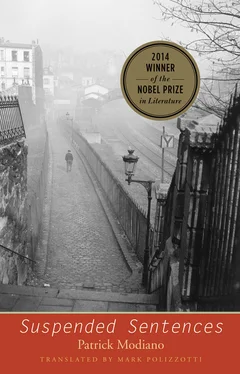I had noticed that Annie and Little Hélène occasionally received visits at the house from people as mysterious and worthy of interest as Eliot Salter, the marquis de Caussade.
Was it Annie who kept up the friendships? Or Little Hélène? Both, I think. For her part, Mathilde maintained a certain reserve in their presence, and often she went to her room. Perhaps those people intimidated her, or maybe she just didn’t like them.
I’m trying today to count all the faces I saw on the front porch or in the living room — without being able to identify most of them. No matter. If I could put names to those ten or so faces parading through my memory, it would prove embarrassing for some people who are still alive. They’d remember that they used to keep bad company.
The ones whose images remain the clearest are Roger Vincent, Jean D., and Andrée K., who they said was “the wife of a big-shot doctor.” They came to the house two or three times a week. They went to have lunch at the Robin des Bois inn with Annie and Little Hélène, and afterward they’d sit around a while longer in the living room. Or else they stayed for dinner at the house.
Sometimes Jean D. came alone. Annie would bring him from Paris in her 4CV. He was the one who seemed closest to Annie and who had probably introduced her to the two others. Jean D. and Annie were the same age. When Jean D. came to visit with Roger Vincent, it was always in Roger Vincent’s American convertible. Sometimes Andrée K. came with them, and she would sit in the front seat of the American car, next to Roger Vincent; Jean D. was in back. Roger Vincent must have been around forty-five at the time, and Andrée K. thirty-five.
I remember the first time we saw Roger Vincent’s American car parked in front of the house. It was the end of the morning, after class. I hadn’t yet been expelled from the Jeanne d’Arc school. From a distance, that huge convertible, with its tan body and red leather seats gleaming in the sun, had surprised my brother and me as much as if we’d turned a corner in the road and suddenly found ourselves face to face with the marquis de Caussade. Moreover, we’d had the same thought at the same moment, as we later confided to each other: the car belonged to the marquis de Caussade, who was back in the village after all his adventures and had been invited over by my father.
I said to Snow White:
“Whose car is that?”
“A friend of your godmother’s.”
She always called Annie my “godmother,” and it was in fact the case that we’d been baptized one year earlier at the church of Saint-Martin de Biarritz and that my mother had asked Annie to act as my godmother.
When we went inside the house, the living room door was open and Roger Vincent was sitting on the couch, next to the bow window.
“Come say hello,” said Little Hélène.
She had just poured out three glasses and was stopping up one of the liquor decanters with the enamel tags. Annie was on the telephone.
Roger Vincent stood up. He seemed very tall. He was wearing a glen plaid suit. His hair was white, well groomed, and brushed back, but he didn’t seem old. He leaned toward us and smiled.
“Hello, children …”
He shook our hands in turn. I had put down my schoolbag to shake his. I was wearing my gray smock.
“Are you just getting home from school?”
“Yes,” I said.
“School going well?”
“Yes.”
Annie had hung up the phone and joined us; Little Hélène set the liquor tray on the coffee table in front of the couch. She handed Roger Vincent a glass.
“Patoche and his brother live here,” Annie said.
“Well, then, to the health of Patoche and his brother,” said Roger Vincent, raising his glass with a wide smile.
In my memory, that smile remains Roger Vincent’s main attribute: it was always playing about his lips. Roger Vincent bathed in that smile, which was distant and dreamy rather than jovial, and which enveloped him like a very light mist. There was something muffled about that smile, as about his voice and bearing. Roger Vincent never made any noise. You never heard him coming, and when you turned around, there he was behind you. From the window of our room, we sometimes saw him arrive at the wheel of his American car. It stopped in front of the house like a speedboat with its motor cut off, carried in by the tide to berth silently on the shore. Roger Vincent stepped out of the car, his movements slow, his smile on his lips. He never slammed the door, but rather closed it gently.
That day, they were still in the living room when we finished our lunch with Snow White in the kitchen. Mathilde was tending the rose bush she had planted on the first terrace of the garden, near the grave of Doctor Guillotin.
I was holding my satchel, and Snow White was going to take me back to the Jeanne d’Arc school for afternoon classes, when Annie, who had appeared in the doorway to the living room, said to me:
“Study well, Patoche …”
Behind her, I saw Little Hélène and Roger Vincent smiling his immutable smile. No doubt they were about to leave the house to go have lunch at the Robin des Bois inn.
“Are you walking to school?” asked Roger Vincent.
“Yes.”
Even when he talked, he smiled.
“I can take you in the car, if you like …”
“Did you see Roger Vincent’s car?” Annie asked me.
“Yes.”
She always called him “Roger Vincent,” with respectful affection, as if his first and last names were inseparable. I sometimes heard her on the telephone: “Hello, Roger Vincent … How are you, Roger Vincent …” She used the formal vous . She and Jean D. had great admiration for him. Jean D. called him “Roger Vincent” as well. When Annie and Jean D. talked about him, they seemed to be telling “Roger Vincent stories,” as if they were recounting ancient legends. Andrée K., “the wife of the big-shot doctor,” called him just Roger, and she said tu .
“Would you like it if I took you to school in my car?” asked Roger Vincent.
He had guessed what we wanted, my brother and I. We both climbed into the front seat next to him.
He backed majestically up the gentle slope of the avenue, and the car followed Rue du Docteur-Dordaine.
We glided on slack water. I couldn’t hear the sound of the motor. It was the first time my brother and I had ridden in a convertible. And that car was so big that it covered the entire width of the street.
“Here’s my school …”
He stopped the car and, stretching out his arm, opened the passenger door so that I could get out.
“Good luck, Patoche.”
I was proud to hear him call me Patoche, as if he’d known me for a long time. My brother was now all alone next to him, and he looked even smaller on that huge red leather seat. I turned around before going into the courtyard of the Jeanne d’Arc school. Roger Vincent waved at me. He was smiling.
Jean D. didn’t have an American convertible, but he had a fat wristwatch on whose face we could read the seconds, minutes, hours, days, months, and years. He explained the complicated mechanism of that watch with its many buttons. He was much more at ease with us than Roger Vincent. And younger.
He wore a suede windbreaker, sporty turtleneck sweaters, and shoes with crepe soles. He, too, was tall and thin. Dark hair and a face with regular features. When his brown eyes rested on us, they were lit by a mix of mischief and sadness. His eyes were always widening, as if everything astonished him. I envied him his haircut: a long brush cut, whereas in my case, every two weeks the barber gave me a crew cut so short that the hairs pinched when I ran my hand over my scalp and above my ears. But there was nothing I could say. The barber simply picked up his clippers without asking my opinion.
Читать дальше












